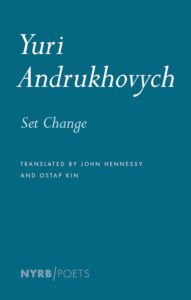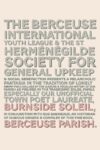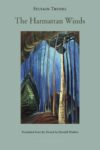
[NYRB; 2024]
Tr. from the Ukranian by John Hennessy and Ostap Kin
Poetry can bring back the dead. It can conjure spirits, ghosts, and other occult figures. It can also bring the living to the dead, guiding heroes through heavens and hells. Sometimes these poems reinforce boundaries by crossing them — the dead remain dead; the living keep on living. But poetry can also unite realms without making a clear distinction between the two. It can disregard any lines between this world and that, present and past, shaking up time and its contents and spitting out something unexpected yet somehow recognizable. This is how the poems of Yuri Andrukhovych work. Set Change, a new collection of just over fifty of Andrukhovych’s poems translated by John Hennessy and Ostap Kin, brings together works from five collections originally published in the nineteen eighties and nineties, early in Andrukhovych’s career. As a young poet, he was already looking back at Ukraine’s frequently violent and chaotic past and forward to its uncertain future. These poems — mostly short, often rhyming in the originals but not in translation — offer a rich variety of images and tones, from somber to playful, sincere to sarcastic, as Andrukhovych unites past and present in a wild clash of memories and imagination.
A poem from early in the collection, “Elegy for Our Neighborhood Figures,” puts this tendency on full display. The speaker exhorts the residents of his old Ukrainian neighborhood to “[c]ome back to me all — illiterate and educated, / as soon as I touch you with my hand — you will come to life again.” Characters like Black Manka and Doctor Dutka and Mrs. Hoshovska appear, as if the reader already knows them, along with the “painters, stokers, gravediggers, suspicious nurses / the tenants of ancient verandas and cramped extensions” that, whether dead or alive, now populate the speaker’s memory. These characters occupy a poetic landscape where the dead are alive and where the living are already consigned to death, a place of “soon-to-be widows” and young people who “descend into the dream of the soil.” A land of constant instability and change, Andrukhovych’s poetic world is simultaneously hopeless — the future is uncertain, cut short — and teeming with the hope of a reclaimed past, which is never out of reach.
The poems in Set Change represent the work of a young poet confronting the uncertainties of his time: the hard years leading up to perestroika and glasnost, the hopes and tensions of that period, and the eventual collapse of the Soviet Union in 1991, seen from Andrukhovych’s vantage point in Ukraine. After years of widespread scarcity and corruption in the Soviet Union, Soviet leader Mikhail Gorbachev enacted policies in the nineteen-eighties that loosened the communist party’s previously strict control of the economy. Meanwhile, the state relaxed its censorship of the media, entailing wider possibilities to openly speak and publish. This lead to a boom of literary creation and artistic innovation, the intellectual environment out of which Andrukhovych, a major figure in contemporary Ukrainian literature, emerged. These growing freedoms also led, at least in part, to the Soviet Union’s disintegration and the formation of its successor states like Ukraine.
For Andrukhovych, Ukraine’s present and future are inextricable from its past under Soviet as well as Austro-Hungarian and Polish rule. History is often made explicit in Set Change, as in several poems from the later collection, Letters to Ukraine. In one of these poems, the speaker muses on Ukraine’s apparently endless cycles of destruction. Its baroque architecture is a reason “why the temptation to obliterate everything / is so strong,” a seeming non-sequitur expressing both Ukraine’s beauty and its grim historical position. In another poem, a trip through Russia’s capital becomes an opportunity to reflect on Soviet-era crimes, with the speaker noting how Moscow’s subway system was “unveiled by the Komsomol back in the thirties, / that is by convicts.” The dead live on in the architecture they leave behind. The past is so full of violence and destruction that, elsewhere in the collection, the speaker describes how Lviv, where Andrukhovych spent much of his young adulthood, “yawned with despair”—the personified capital, standing in for Ukraine, is simultaneously horrified and bored out of its mind. Andrukhovych takes this history as his subject, calling out the barbarity of the past and its resonances in the present, where Ukraine continues on, “even though / we’re forgotten and no one talks about us in Europe.” While these last lines originally appeared in the 2013 collection Letters to Ukraine, they feel intensely relevant today, three years after Russia’s invasion of Andrukhovych’s home country.
In these poems, the past isn’t just political in a broad sense but intimate and personal too. “Elegy for the Sixties” begins by evoking a placid summer evening seemingly untrammeled by individual or social concerns:
Summer, the smell of a soccer ball, elderberry, currant,
couples made out in the evening bushes,
and when the twilight descended beyond the river,
the stony sidewalks smelled of warm rain.
Here, as in other poems, Andrukhovych adds detail on detail, almost elliptically, to place us in a vividly imagined scene from a time the speaker can only return to in poetry. For the speaker, however, this scene is alive and dead at the same time; nostalgia is a tenuous creation of memory. Night falls, the soccer ball momentarily disappears, and the speaker hears frogs croaking in a park “where they carried knives.” This proverbial they warn the reader of violence lurking in plain sight, the transition from innocent play into something sinister. The poem ends firmly in an image of unease: “spooky carousels horrendously circled / and creaked for us, as in a dream, until morning.” The memory dies almost as it comes back, but it never disappears entirely, morphing instead into a more somber meditation. Set Change is filled with such dark, striking images of violence or the threat of it, sometimes dipping into the fantastical or the grotesque; nostalgia is complicated by the darkness of reality.
Andrukhovych seems like he had fun writing these poems, sometimes using a dark humor and playfulness that make the poems lively and surprising to just the right degree, while still honoring the seriousness of his subjects. The word “spooky” in the stanza quoted above, self-aware yet still subtle, adds a hint of irony to temper an otherwise horrifying image. In another poem, the speaker presents an audience in Lviv with the bones of the dead that have been buried under their feet, announcing the skeletons as “these basement bones,” an irreverent epithet undercutting the macabre image and suggesting the banality of ever-present death. In “A Chronicle of 1719,” the speaker recalls the courtyards and dungeons “where the linens of the executed flutter,” a darkly comedic image in which the dead live on in the form of their hanging laundry. Andrukhovych’s playfulness also comes across in the way he jumps between registers, often within individual poems. In Hennessy’s and Kin’s translations, the language ranges from coldly bureaucratic (bodies being “processed” into their graves) to colloquial (“a chill life”), making the translations feel contemporary and lived in.
The translations also pay close attention to the sounds of the poems in English, creating a lightness and a lyricism that make the poems a pleasure to read. This lyricism is particularly evident in the poem “Underground Zoo” from the collection Exotic Birds and Plants:
Living under the city, lions, yellow and sleepy.
The hot grass hides them.
Flying zebras, antelopes, and horses
bloom on the bottom of pastures and savannas.
Living under the city, crocodiles too.
Entangled in the sweet veins of vines,
shiver the shadows of monkeys or parrots.
And hundreds of hundreds of flies, ants, and toads.
From the drowsy, comma-induced hesitation of “lions, yellow and sleepy” to the buzzing cacophony of T-S and D-S pairs in “hundreds and hundreds of flies, ants, and toads,” or the entangled S and V sounds in “sweet veins of vines,” sound alone suggests the images the words signify while also creating an aural effect beyond any image. In the poem’s final stanza, we learn that people live under the city too:
Living under the city, people. Pilgrims
and burghers. Their wings in their sleeves.
The penny-prized, vicious circle of faded
amusements spins around again—
everything remains the same. Beer fests,
wedding fiddles, lanterns, horseshoes,
kisses, crying, love, and darkness…
Under the city. Which is long gone.
The poem’s initial exuberance is tamped down, and the images become ambiguous. We don’t know who these people are, why they live under the city, or what “the city” even is. In the poem’s terse final line, Andrukhovych reveals, like a somber magician sadden by his trick, that the city we’ve heard so much about in the poem “is long gone.” This final stanza conveys a feeling of drudgery and malaise, far from the excitement of the poem’s early lines. It reminds us that Andrukhovych is committed to a fuller, richer vision of the world, one that can waver between joy and despair.
But commitment is tricky when nothing is constant. Like the vanishing city in the stanza above, the images in Andrukhovych’s poems, with all their variety and precision of detail, are liable to dissolve. This often happens within a single line or sentence: the language of the concrete often becomes abstract, in a bewildering assault on the reader’s senses. These are poems where an airplane “drinks the dense sky,” the speaker sees “a hot lump / of living seconds,” and a creature “lays centuries” like eggs. Such turns of phrase, found in nearly every poem, leave me unsure of what exactly I’m seeing, or what it means. Nothing feels entirely stable, other than a general sense that trying to hold on to anything at all is a fool’s errand. Andrukhovych wrote these poems in a period of great uncertainty for Ukraine and the world — and in that sense, not much has changed. In his poems, Andrukhovych looks straight into that uncertainty. That’s part of what makes his poems so unexpected, full of sudden turns and backtracks and dead ends, each poem its own wild and difficult yet rewarding adventure. Decades after he wrote them, it’s also what makes the poems still so relevant and personal today: his poems capture the feeling, whether tinged with anxiety or excitement, of never quite knowing what’s next.
Noah Slaughter writes fiction and essays, translates from German, and works in scholarly publishing. He lives in St. Louis.
This post may contain affiliate links.






